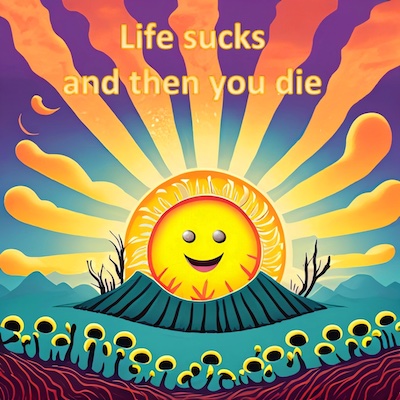Maybe you’re just human. We’re all just human.
“No one ever said to me, ‘Maybe you’re just human,'” my client told me last week.
I’d just told her something like “You’re just human. What you’re feeling are very common emotions.”
I worried I might have offended her. After all, everyone wants to feel unique, but here I was telling her she’s just like everyone else.
In our first session several weeks ago, she went on and on about crippling anxiety, a complete lack of motivation, impostor syndrome, being terrified to try anything new.
But by our third session, I just hadn’t heard anything to back up all that dire language.
It seemed she was getting along just fine. She was doing well at work and had good relationships with her friends and family.
She didn’t have all those dreadful things. What she had was normal trepidation about risk, a modest fear of failure, a modest fear of embarrassing herself, and that vague self-doubt nearly everyone feels from time to time.
You’re not special, you’re just human
When I told her, “I think you’re just feeling some very human emotions that a lot of people feel,” I was worried that I’d offended her.
Everyone wants to feel special. Everyone wants to feel unique. By saying “you’re just human,” I could be taking away her feeling of individualism.

The feeling that “I am special because I have worse problems than other people” is one kind of trap that people build for themselves.
Perhaps I should listen to less emo music, but there’s a lot of one-upsmanship these days in how anxious, depressed, and dysfunctional people claim to be.
Or rather, not “claim to be.” That implies they are intentionally exaggerating their emotions, when in many cases they simply don’t have a properly calibrated scale to measure their own troubles against.
It turns out I had not offended her by saying she was like everyone else. Instead, I’d reassured her that what she was feeling was entirely normal… and more important, that she was coping through it quite well.
The escalation of everyday language that leads people to transform regular emotions into anxiety, depression, ADHD, impostor syndrome, and other very real conditions surely doesn’t help.
It turns out I didn’t take away her individualism. What I did was give her a properly calibrated scale to measure herself against. And on that scale she was well within the normal range.
Then I worried that maybe I’d damaged her hope.
There’s no hope. You’re just human.
It’s kind of a perverse inversion, but if you’re normal and think you have it worse than everyone else, then that may mean you have an inflated positivity about the human condition in general.
That is, you think everyone else has it better than you. You think everyone else is better than you.
This skewed perspective may originate from various places:
Social media has us comparing our own reality to everyone else’s highlight reel. Parenting trends of overprotectiveness, over-scheduling, and every kid getting a trophy have raised expectations of entitlement to bigger, faster, more meaningful rewards.
And of course achievement culture insists that you can be anything you want. You can do anything you set your mind to. You are a powerful badass superhero, just like everyone else! And you should be doing that all today.
So why don’t you have more? Why don’t you feel powerful, badass, and super?
Everyone else is powerful, badass, and super. So there must be something wrong with you. But if there isn’t something wrong with you… if you’re just human… then does that mean that… everyone doesn’t truly feel like a powerful, badass superhero?
And if everyone feels this way, all the time, then maybe the old saying is true:
Life sucks, and then you die.

So when I thought maybe I’d destroyed all her hope that things might get better, I added, “I know that I look like I’m very put together and extremely confident. But I have all those same feelings frequently, too. We’re all just human.”
That was when my client told me, “No one ever said to me, ‘Maybe you’re just human.’ That was really meaningful for me. Thank you.”
It’s important to remember that we’re all just human.
I’ve had a number of friends and colleagues tell me recently that they’re inspired by all I’ve been doing these past couple of years. Courageous and fearless are two of the words I’ve heard in the past two days alone.
Those who know me well would say that I do not suffer from low self-esteem. I think they’re right. I have a pretty strong sense of self and self-worth. But that doesn’t mean I am free from insecurity, fear, shame, or guilt.
I’m just human, with all the human emotions.
We’re all stumbling through life doing the best we can, with the information we have, carrying all the baggage that’s been given to us. Some start with more privilege. Some have worse luck. But we’re all human.
Life sucks, and then you die.
For the record, I think that’s both true and untrue. Life does suck. It’s hard to do it well. It’s complicated and messy, and there are tons of forces actively working against you. The world is a cruel place.
On the other hand, life is beautiful and wonderful and magical. It’s complicated and messy, and there are natural beauty and charitable souls all around you. Opportunities abound.
It’s easy to forget that. After all, you’re just human.
I can help.
I work with top executives and middle managers to improve their leadership skills, their workplace culture, and the effectiveness of their teams. Also, I help individuals identify and achieve their personal goals. Would you like to become more aware, be more effective, be more empowered, and feel fully prepared for your next steps?
You can help.
Think of one person who would benefit from reading this post. Sharing is caring! Forward it to them right now. They will think you’re super smart and well informed.
Stay super smart and well informed.
Be sure to join my email list! Get notified of new posts here as well as new courses, books, and events from me both here and at Gray Bear Publications.



1 Comment
Unification and consensus have their roots in empathy - Gray Bear Coaching LLC · July 23, 2024 at 3:50 pm
[…] boss isn’t proactively offering them a promotion after a year of good performance. They have moderate feelings of self-doubt. They feel nervous about giving presentations. They are unsure what their next career move should […]